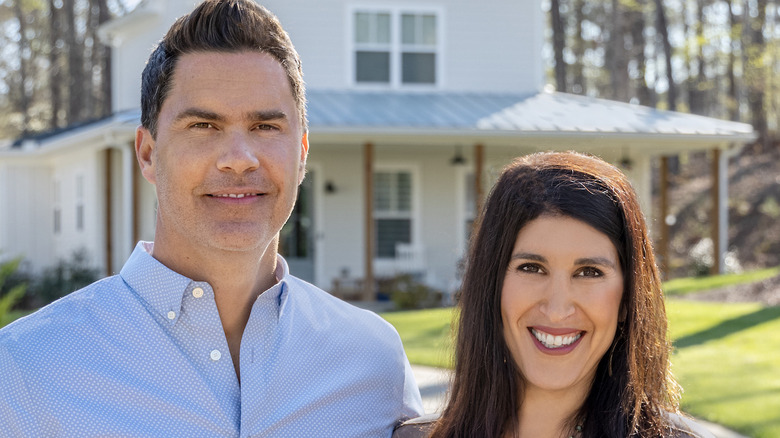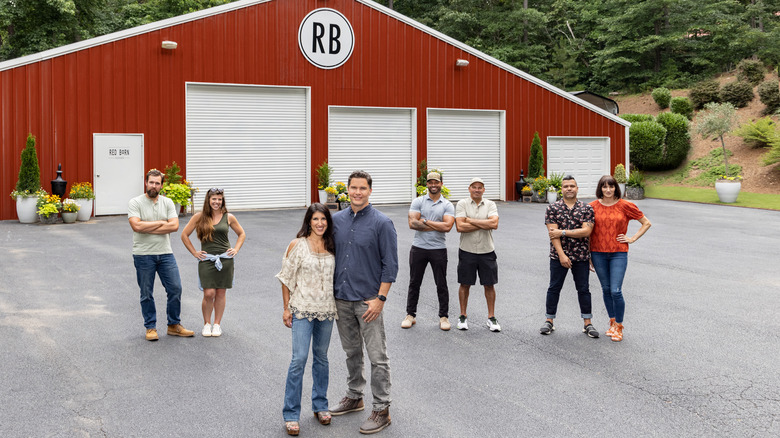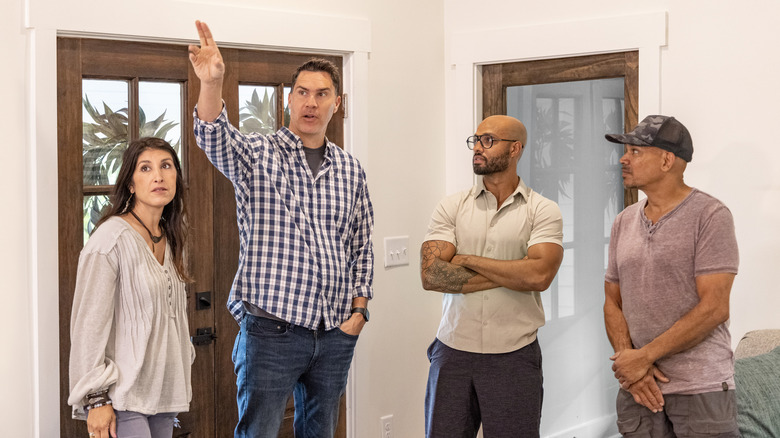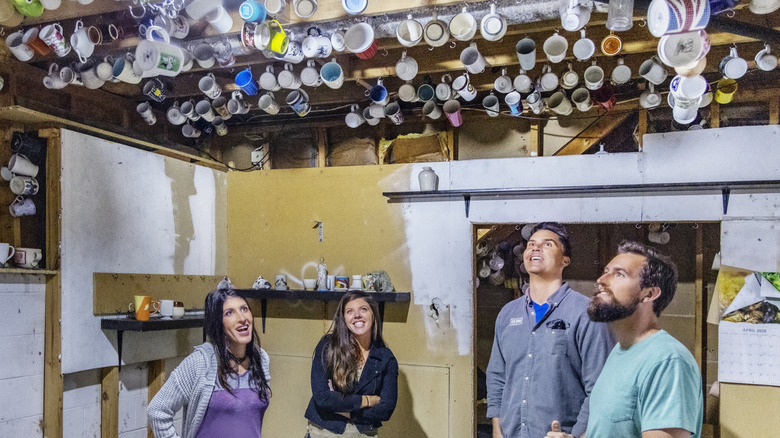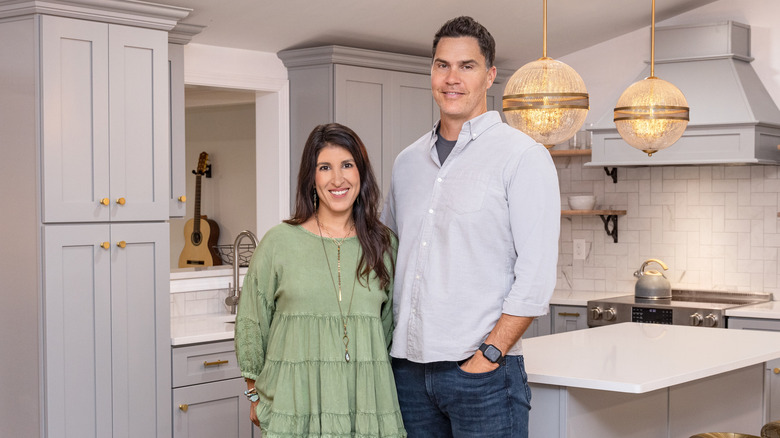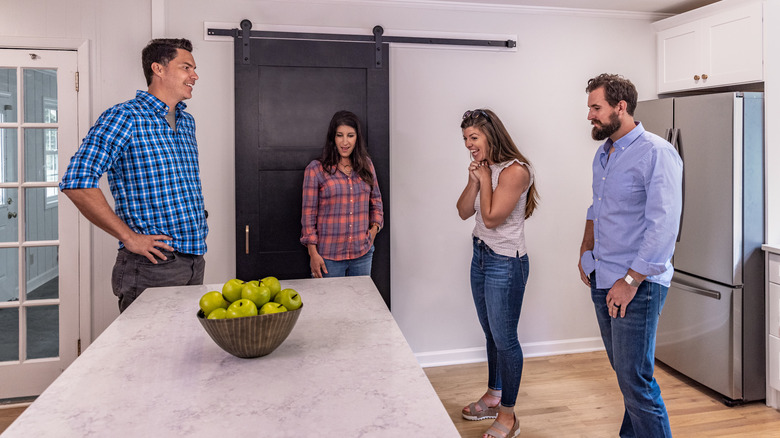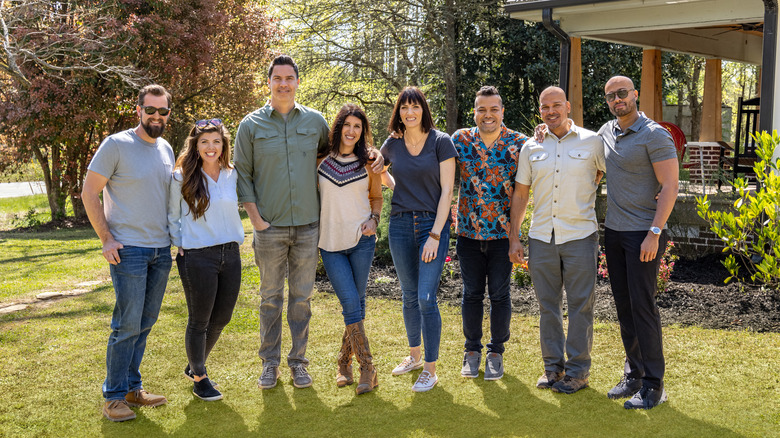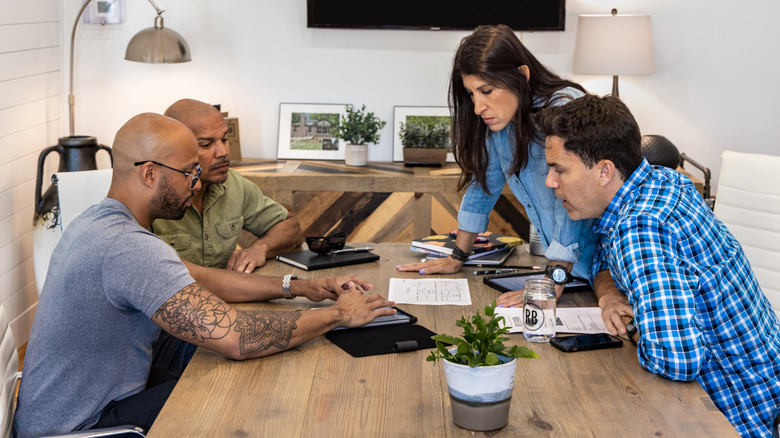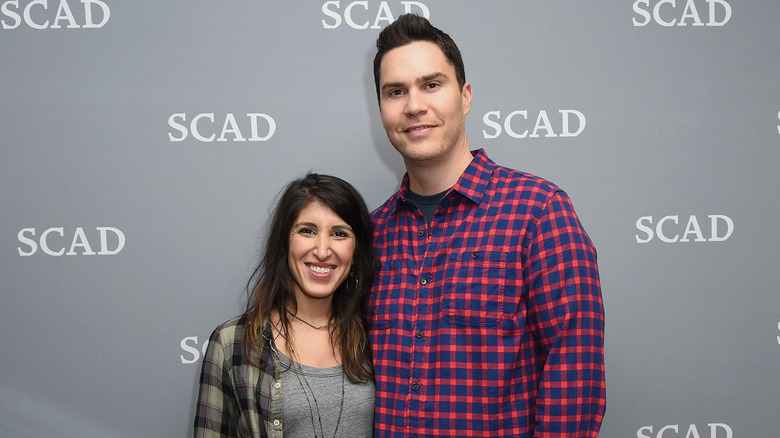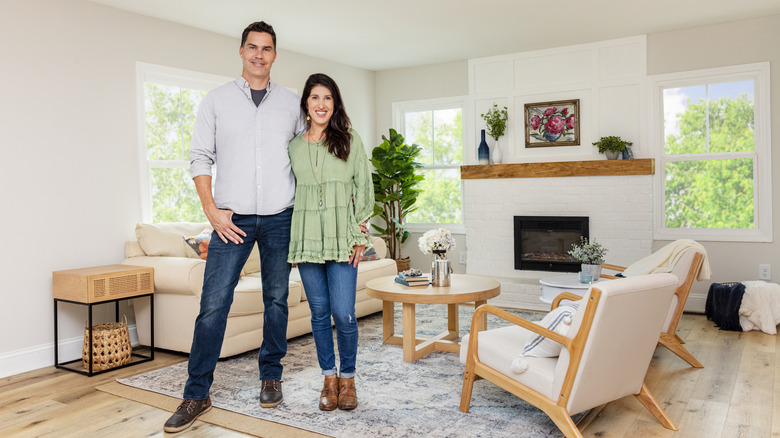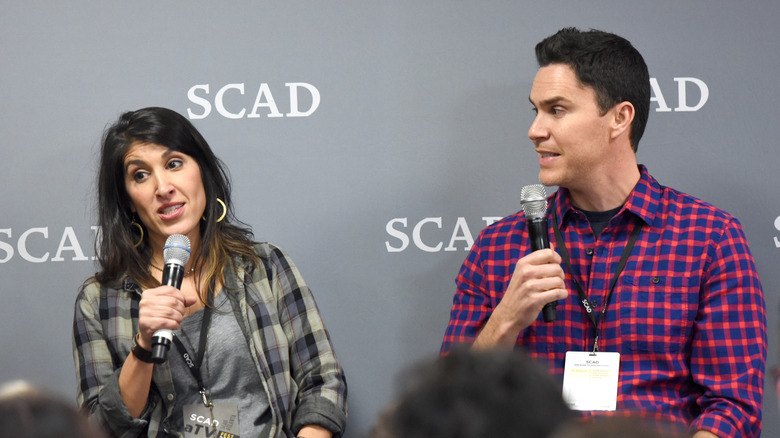Ken And Anita Corsini On HGTV's New Competition Series Flipping Showdown - Exclusive Interview
Fans of HGTV are familiar with Ken and Anita Corsini from their series "Flip or Flop Atlanta." The real estate power couple, who are the owners of the Atlanta-based Red Barn Homes, are back with a new competition series for the network, "Flipping Showdown," in which three two-person teams compete in a renovation-and-flipping challenge that will net the winning team $100,000 and the opportunity to launch their own Red Barn Homes franchise. Having renovated and sold more than 800 homes, the Corsinis are investing $2 million of their own money to fund the budgets for the competitors' reno challenges.
"This is the ultimate job interview," Anita shared in the HGTV announcement. "We want these competitors to fight hard for the chance to join our successful business, and we need to make sure they have what it takes to be a part of our brand that we worked so hard to build," noted Ken.
In an exclusive interview with The List, the Corsinis tell fans what they can expect from the inaugural season of "Flipping Showdown," share the home-flipping expertise they've learned over the years, recall how they came to be discovered by HGTV, and much more.
Ken and Anita Corsini explain the concept behind Flipping Showdown
What can you tell me about "Flipping Showdown"?
Ken: Well, it's a competition flipping series. So the whole premise of the show is that three different teams actually picked up their families, moved to Atlanta for about five months, and participated in a competition where they each flipped three houses. So it was a total of nine houses flipped over the season. Each round got increasingly difficult. And at the end of of the day, we crowned a winner and that winter got $100,000 grand prize and they got a Red Barn franchise.
From what I've seen of the series, it looks like the three teams each do bring considerable skills to the table, but is that actually how it ended up playing out?
Anita: Yeah, they did. They all have experience. Now, all of their experience is very different. So it was really interesting to see how each team took on a project, like their initial perspective, or their initial, I guess, techniques, because everybody does things a little bit differently and each of them brought different skill sets to the table. So you've got one who's a really fast-and-furious real estate agent who knows how to pick a deal, which is, honestly, I mean, that's a big part of flipping, is knowing which house to choose. And then, you've got the other couple that does flipping on a regular basis, but they're relatively new to the game and they don't really know much about this area, so that was challenging for them. And then, you've got these brothers who've never worked together, but one's an agent [and] one's a craftsman. And so, seeing them, one, figure out how to work together, and, two, bring their skill sets to come to work together really quickly was ... It was really quite fascinating.
The criteria that Ken and Anita Corsini use to judge the projects on Flipping Showdown
Ultimately you're going to be judging the final product. What criteria do you use when you're looking at the finished homes?
Ken: It's a great question because it wasn't just the end products. A lot of it was how did we get it there? [Then], obviously, how much money did you make? When we flipped the house, you increased the value of the house so much, obviously, that weighs into the equation, but that's really only one component. We were also looking to see, how do they manage their budgets? How did they manage their time? Did they actually finish on time? And then, of course, we're looking at rewarding somebody with a Red Barn franchise, so how well do they represent our brand? Could they be brand ambassadors? How do they treat the people around them? The design aesthetics, things like that. Are you a good designer? Can you implement a design? So we're looking at a number of different components to judge the ultimate winner.
Anita: Right, right. Sometimes, it's one thing, it's can you plan and budget? And can you stay on that plan and budget? Or can you make the plan, and then when something goes sideways, how do you scale back? I think it's always important in business to see how people operate not just under pressure but under restriction. When someone says, "Okay, now you're out $10,000 because the septic tank ..." — which is nothing sexy, let's be honest, okay? Well, where's that [money] going to come from? And how are you still going to make it happen? And that, to me, excites me about flipping, because I love playing that game. And I think that game is what really I've refined well, so it's just interesting.
Viewers of Flipping Showdown should expect the unexpected
Now, one of the things that I've noticed from my own home renovations and even just from watching HGTV shows in general is that you always have to expect the unexpected — like you said, things like the septic tank or other stuff that pops up. So should we assume there were some surprises that reared their heads during this process?
Ken: You will, absolutely. And, as I mentioned too, each round got progressively harder. And so, these houses that really needed a lot of work, I mean, you start getting behind the walls and there's all sorts fun challenges to overcome, you're exactly right. Well, we gave them a budget, but you can sometimes throw that budget out the window when you get in behind a wall and you discover termites or whatever else.
We encountered almost all of it in the show, which was great. I mean, we wanted to see how do people respond when you feel like you have a challenge now that's insurmountable [and] you have a budget. "How am I supposed to finish this on time? How am I supposed to come in on budget?" I mean, it creates for really good television, I'll put it that way.
Anita: It does. It does. I mean, if you think about it, a couple of the houses — one was a house that's been asleep for 25 years. No power to it for ... I mean, that's a big deal. And then, you've got another one that's over 100 years old. So if you don't find something unexpected in those houses, something is wrong.
No kidding. Now, in addition to the whole competition aspect, you're also going to be launching some new potential HGTV personalities. Did you have any advice or tips to offer them in that respect?
Anita: Yeah. We really just told them to be themselves. I mean, they were in it, really, to compete. So they really had two big challenges here because one, they've never been on camera and two, they really are competing. And so, the stakes were high. There's a lot of emotion involved here. So, yeah. I mean ... we have great relationships with them.
Ken: We still maintain contact. So we finished filming a number of months back and we're still in contact with all of them pretty regularly. We really created good friends from this whole experience. And so, there's still some level of mentorship like, "Hey, what should we do here? What should I do with my social media?" And so, I feel like we've created some long-term friendships out of the show that I imagine will continue into the future.
How Ken and Anita Corsini were discovered by HGTV
I'm always fascinated by how people become involved in HGTV and how the network finds its stars for its shows. And, from what I've seen, no two stories seem to be alike. So how did you two wind up on HGTV?
Ken: We get asked this question a lot. It was really as simple as this: It was a random phone call in 2015 from a casting director to my office. I think they found us through an online presence where they saw that we had an investing company. And it was legitimately out of the blue, and it was, "Hey, do you want to have a Skype call with us?" And it was just like, "Okay." So we literally set up a Skype call. Of course, everybody used Skype back then, right? It's Zoom now. But back then, it was a Skype call, and it was just talking about who we are, what our business looked like, and, of course, that turned into a sizzle reel, and that sizzle reel turned into a pilot, and the pilot turned into a series, and then it's been no looking back.
The TV lessons Ken and Anita Corsini have learned about being on camera
I imagine when you embark on a journey like that, there's going to be a learning curve about where to stand, how to present yourself, what to do with your hands, all sorts of weird little things that you pick up about being on camera. So what lessons did you take from "Flip or Flop Atlanta" that you're bringing to this new project?
Anita: Well, let me tell you, the biggest lesson that I learned was shut your mouth when you have a microphone on. I mean, I'm an outward processor, so every emotion that I feel usually comes out of my mouth, and then it didn't even dawn on me that I was mic'd and somebody could hear ... I mean, sometimes, they turn it off and they don't hear. But it did really matter. Tell you what, though. If you want to learn how to keep your mouth shut, wear a microphone all day long. That was the biggest thing I learned from that. But we had an amazing crew who really ... They told us things ... The camera didn't bother us because we were together, and I think being together helps, but they worked all that out.
Ken: And luckily, so we had the same crew for both seasons of "Flip or Flop," and then a lot of the same crew, even for this show. So it was almost like a reunion, getting back together with all your old friends. And, to your point, you do learn how to stand, and how to open yourself to the camera, and how to not mumble. I mean, it's funny just having filmed 28 episodes of the "Flip or Flop" series, you just learn. You learn where the cameras are and where they need to be. And it's funny because even working with these couples, they didn't. They were brand new. And so, we found ourselves in a lot of situations where we're almost having to coach them a little bit, like "Now, you're going to have to open yourself up ..." But it's just because now it's become second nature for us.
Anita: Right. Well, in continuity, we were doing all these takes at the beginning. I mean, we hadn't even met them yet. Right? They just came out of their trucks. It was the first time we'd seen them. And all of a sudden, I think it was one of the brothers, they, all of a sudden, had sunglasses on their head, and I was like, "Buddy, uh-uh, you didn't have them on the first time." And it was just details that I saw because I knew you're supposed to look for that, but they picked up.
Ken: They picked up. By the end of the season, they were pros, too.
The advice Ken and Anita Corsini gave the home-flipping teams along the way
How has it been different for you in this show, where you are watching the work of others and observing versus having to do it yourself? Did you find sometimes you had to hold yourself back? Maybe thinking to yourself, "Oh, I wouldn't do that."
Ken: Yeah. That is actually a really good question for this show because it was a delicate balance for us. We wanted the show to play out, but it was legitimately our money on the line, right? So I wasn't going to let them make some huge glaring mistake that was going to cost me money just for the sake of really good television. So we had veto ability, which we really, I think, only played once, maybe twice, throughout the whole season. We wanted to let them play out. And the reality is just because they picked designs that weren't necessarily ours doesn't mean that the house wasn't going to sell for any less, right?
It's okay you pick that tile; we would pick this tile. That's totally fine. But if you were going to do something to the house that was legitimately going to make the house sell for less, it was really going to be detrimental to us, personally, then we'd be like, "Okay, sorry, you can't do that."
Anita: Yeah, yeah. And these designers, they had very different design styles than I would've chosen for a lot of these houses. They gave them different personalities than I would've. And that was quite harder for me than Ken, just because I'm watching it and going, "Hmm." But it was fine. I would tell them, I said, "Listen, this is your design. This is not my design. You don't have to make a house that you think I would make. I want you to make your house. But I have to be able to sell this house when you're done with it. So don't make anything stupid."
Ken: And she said it just like that actually.
What they learned working with the competitors on Flipping Showdown
I guess, on the flip side of that, when you see someone do something that you would say, "Oh, that's a little off the wall," do you also think, "Oh, you know what? Here's an idea," or "Here's something I haven't thought of before," that you could actually bring into your own business?
Ken: They were very talented. I want to get that out there. All three teams were very talented — some more design, some more from a construction standpoint — and all of them did a really good job throughout the season.
Anita: They did.
Ken: I mean, honestly, our production company did a very good job casting these three teams. And so, yeah. I mean, from a construction standpoint, I mean, one team was way better in terms of construction, carpentry than either of us. Design-wise, I wouldn't say they are better than Anita, just different than Anita, but they were still very talented in their own rights. So, yeah, I mean, I think even though it was different than the way we would've done it, it was still eye-opening.
Anita: Right, right. But, see, these are experienced people, so they've flipped a house before. So, in a sense, they knew you don't paint a house purple to try to sell it at a profit. I mean, they knew that. So it wasn't like we had to babysit. There were a couple things, in terms of floorplan, layout, basic things in their planning phase, that we said, "You know what? That's going to make it tricky to sell only because we've experienced that here in our area. So maybe rethink that." That kind of stuff.
Ken: So they did get coaching from us. And that was part of it. We were there throughout the entire process. And so, occasionally, we'd come in and we would chime in, and gently guide them, put some guardrails a little bit around what they were doing. And they very receptive to that.
Anita: Yeah, it was interesting. I mean, it is. But you do gain [a] different perspective from what other people create. And then, you're trying to help them not make the same mistakes you've made, but in some situations, you have to let them make those mistakes because they got to learn. And so, that's a delicate balance there.
How Ken and Anita Corsini first got into house-flipping
How did you two get into house flipping in the first place?
Ken: That's another good question. I mean, it's been a long time. So, I mean, we both had [a] 9-to-5, I had a 9-to-5 coming out of college at a large insurance brokerage. It was a great career, but I just knew I wanted to get into something entrepreneurial, and I really liked real estate a lot. And so, it was 2005; we didn't have kids yet. She was a teacher. And I was like, "Anita, if we're ever going to just do this, I mean, now's the time to do this." And so, I literally just walked in, and I quit, and I just put my head down and said, "I'm going to figure this out." And we never looked back. It was 2005.
What are the biggest mistakes that you see rookie house-flippers make? People who maybe see people like you on television and say, "Oh, I can do that." What's the biggest mistake that you see people making?
Anita: For me, I think it's choosing the wrong house, or not identifying the right price point for the house, or not having the skill set to assess the house for the price you're paying. It's the bones. You got to get the bones right or, at least, know what bones you're working with.
Ken: And in buying, like she said, at the right price point. I mean, so many people want to jump on the MLS or go grab a real estate agent, [and say] "Go find me a house to flip," and it just doesn't work like that. At least, not anymore. I mean, a house that you can buy on the MLS is already at market value. It's very rare you're going to find any houses on the MLS with enough meat on the bone to fix it and sell it for a profit. And so, the rookies, I think, underestimate what it takes to find the right properties to flip. And then, they probably also underestimate how much money needs to go into the houses to make them sellable as well.
Anita: You're right. So I would say, and it's twofold. It's identifying the house and then [it's] over-renovating the house. Because so many people, they think you need to do more to it to sell it, or they just do too much to it, and, really, that extra $20,000 is ... You're not going to get it back. So, I mean, there's a definite art and there's a definite science. And, really, you need a good marriage of both of those things.
Ken and Anita Corsini reveal their upcoming TV project
That's a perfect way to put it, I think. Now, you also, obviously, have to love what you're doing. What do you love about the whole house-flipping process?
Anita: I love that I don't have to sit down all day. We love the flexibility of being here and around for our kids. I'm still taking them to practice every day and that kind of stuff. And that's a big part of it. But I think, in general, we do love real estate. We love home, everything that has to do with home. And, yeah. I mean, I love the flexibility.
Ken: Yeah, I mean, for me, I was always an entrepreneur. I mean, even [as] a kid, I was the kid at school that was hustling candy out of my locker. The idea of buying at one price, and then the arbitrage of selling it at a higher price, to me, it's just always got my juices going. And so, finding that deal that you know you bought so well, just so far as you know that there's opportunity to fix it and make a profit. As an entrepreneur, it's fun. It's fun chasing deals. It's fun landing deals. It's fun to wear a lot of different hats creatively to take a product that's in this state, and then spit out an end product that is just [evident in] the before and afters [is] amazing; there's opportunity for profit. And to create systems around that, again, as an entrepreneur, that's just, to me, it's very fulfilling.
Now, beyond "Flipping Showdown," do you have any other TV projects on the horizon and anything coming up?
Ken: Actually, good question. We just filmed an episode of "Homestead Rescue" on Discovery, which was a lot of fun. It was a good friend of ours, the showrunner of the show. And there was an opportunity; they needed some talent to come in and help with one of the homesteads. And so, that's actually going to air, I think, in December. Sometime in December. But that was a very different show, to go [to] somebody who's living off-grid, trying to create a homestead, and come in there and help them. Because she's got an amazing garden, we have animals on our property, and so, there actually were some synergies where we knew what we were talking about when we went to this ranch.
Anita: It was really, really, really fun. And, I mean, I loved connecting with these people and hearing ... I mean, their story is just amazing. It was fun. I mean, it was hard work. I mean, we worked hard for sure. But it was also just a really, really cool experience. I think we were both really thankful for that.
Ken: Well, it's fun to do a crossover, I mean, between Discovery and HGTV. It was an opportunity to [promote] our show that'll be airing at the same time and just experience something totally different than HGTV. And it was a lot of fun.
The one reality show Ken and Corsini will always watch
Now, to shift gears just a little bit, I wanted to ask about reality television. Are either of you a fan of reality TV?
Ken: I mean, I think, over the years, we've watched our fair share of reality TV. It's funny, now ... we've got kids that are involved in everything, and so, in the evening, I mean, the TV's rarely even on. It's just us driving all over the place. We don't watch as much as we used to, but we've definitely grown up in the reality TV generation.
Anita: We're just Uber drivers now.
Ken: Yeah, we're glorified drivers for our children.
Anita: For our three children, yeah.
Any favorite reality shows that you can recall that you used to just always watch?
Anita: We love "Big Brother."
Ken: "Big Brother." Yeah, there's one show throughout the year, that, this is the show we're all going to sit down and watch or record and make sure that we watch, [and] it's "Big Brother." Yeah, absolutely.
Anita: Our production company produces that, so we've been able to see that when they shoot it. We've gone to [the "Big Brother" house]. It's just so fun.
Ken: We have a little bit of a connection there. We've been to the finales before; we've been to the after parties.
Anita: It's been fun. So, that one, I would say, is one that we always watch.
New episodes of "Flipping Showdown" premiere Wednesdays at 9 p.m. ET/PT on HGTV and are available to stream the same day on discovery+.
